|
Vietnam News Today (Mar 19) notable headlines Denmark, Vietnam intensify cooperation in green seaport projects Vietnam and Uzbekistan foreign ministers hold discussions Vietnam unilaterally exempts visas for 13 nations Vietnam, RoK enhance agricultural collaboration Vietnam continues to be among the world’s emerging economies: Asian Insiders Vietnamese and American universities forge training partnership Vietnam assists Laos in ensuring security during its ASEAN Chairmanship Year Vietnam bucks global trend of declining economic freedom: US news site Vietnam Innovation Challenge 2024 officially launched |
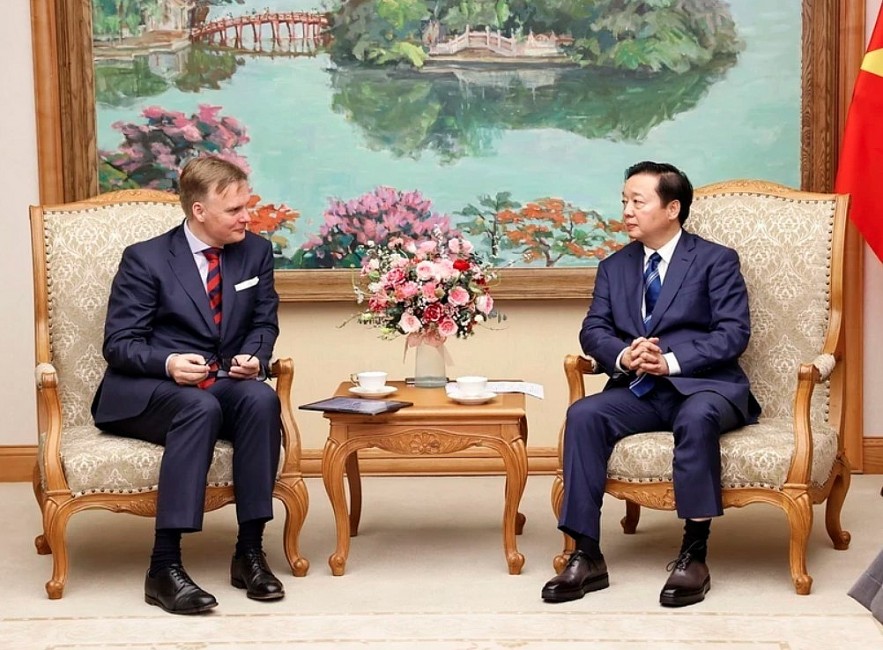 |
| An overview of the reception. |
Denmark, Vietnam intensify cooperation in green seaport projects
Vietnam is prepared to provide favorable conditions for Denmark’s APM Terminals Company to pilot a green seaport project following the Vietnamese government’s policy of transitioning rapidly to renewable energy said Deputy Prime Minister Tran Hong Ha at a reception for Keith Svendsen, Global CEO of APM Terminals on March 18 in Hanoi.
Deputy PM Ha emphasized the longstanding friendship and cooperative ties between Vietnam and Denmark. He mentioned the Green Strategic Partnership that has opened up numerous opportunities for Danish businesses to invest in the Vietnamese market, particularly in the areas of green economy, renewable energy, and seaport infrastructure.
Deputy PM Ha stressed the significance of developing a seaport system alongside the international commercial shipping route to meet the growth requirements of the processing and manufacturing industries.
Deputy PM Ha highly appreciated APM Terminals’ plan to develop a green seaport system amidst increasingly stringent environmental and greenhouse gas emission regulations, as reported by VOV.
Svendsen commended the Vietnamese government’s efforts in improving the business environment and creating favorable conditions for foreign investors. He also acknowledged the progress made in digital and green transformations towards achieving sustainable development goals.
Svendsen expressed his desire to explore further investment opportunities in building the largest modern deep-water container seaports in Vietnam through digital and green initiatives. He also requested continued support from the Vietnamese government in the near future.
Vietnam and Uzbekistan foreign ministers hold discussions
Vietnamese Minister of Foreign Affairs Bui Thanh Son held talks with Uzbekistan’s Foreign Minister Bakhtiyor Saidov in Hanoi on March 18.
Minister Son acknowledged that this is the first visit to Vietnam by an Uzbek foreign minister since the establishment of diplomatic relations in 1992. He viewed this occasion as an opportunity to review and agree on directions and measures to strengthen the long-standing friendship and promote practical bilateral cooperation in areas of mutual strengths.
Minister Son highlighted the impressive growth of bilateral trade between the two countries, which averaged over 30% per year from 2021. In 2023, bilateral trade reached US$159.7 million, up 32% year on year.
Vietnam values its relations with traditional friends, including Uzbekistan. Minister Son expressed hope that both nations will continue to leverage their political foundation and good relations to create new momentum in cooperation that aligns with their needs, desires, and strengths.
Foreign Minister Saidov, who is visiting Vietnam from March 17-19, praised Vietnam’s foreign policy of independence, self-reliance, and “bamboo” diplomacy. He acknowledged Vietnam as an important and traditional partner for Uzbekistan in the region. He expressed his desire to deepen bilateral collaboration, especially in the fields of economy, trade, investment, agriculture, and education, according to VNA.
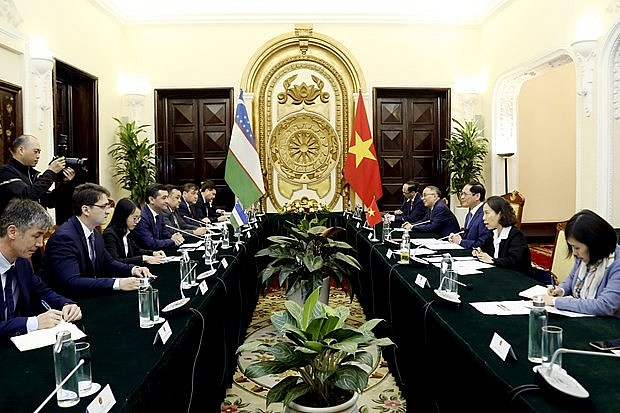 |
| At the talks between Minister of Foreign Affairs Bui Thanh Son and Uzbekistan’s Foreign Minister Bakhtiyor Saidov in Hanoi on March 18. (Photo: VNA) |
Foreign Minister Saidov expressed his expectation for Vietnam to serve as a bridge to help Uzbekistan strengthen its cooperation with the region, including expanding joint work between ASEAN and Central Asia.
The ministers exchanged information on their respective countries’ socioeconomic development, major foreign policy directions, while reviewing bilateral cooperation and the implementation of agreements reached by high-level leaders in the past period.
Both ministers agreed that the Vietnamese and Uzbek foreign ministries should maintain an information exchange mechanism, enhance coordination, and play a coordinating role in connecting ministries and sectors of both countries to explore potential and seek new collaboration opportunities.
During the talks, Minister Son expressed gratitude to Uzbekistan for creating favorable conditions for the Vietnamese expat community in the country.
Vietnam unilaterally exempts visas for 13 countries
Vietnam currently grants unilateral visa exemptions to 13 countries, which are key tourist destinations, Minister of Foreign Affairs Bui Thanh Son announced during the Q&A session of the 31st National Assembly (NA) Standing Committee on March 18 in Hanoi.
NA deputy Ta Thi Yen, vice head of the NA Delegate Affairs Commission of the NA Standing Committee, emphasized Vietnam’s growth from a war-torn, poor, and underdeveloped country to a developing nation.
In 2023, Vietnam recorded a per capita income and GDP of approximately US$433.3 billion, ranking fifth in the ASEAN region and 35th in the world. Vietnam is also the third most populous country in ASEAN and 15th in the world.
In recent years, Vietnam has become an increasingly popular tourist destination. As such, the country has unilaterally exempted visas or signed visa exemption agreements with several countries to facilitate tourism promotion and foreign investment.
However, Vietnamese citizens still encounter difficulties and complications when applying for visas, and there is room for improvement with visa exemptions for Vietnamese citizens in other countries.
Minister Son emphasized that amid the current trend of deep international integration, not only citizens from other countries are coming to Vietnam, but Vietnamese citizens also have a greater need to travel abroad for business and tourism purposes.
In response to this trend, the Vietnam Ministry of Foreign Affairs has implemented three important measures to promote international exchanges. These measures include simplifying immigration procedures through coordination with ministries and sectors, passing the Law on Entry and Exit of Vietnamese Citizens and the Law on Entry, Exit, Transit, and Residence of Foreign Citizens in Vietnam, and negotiating bilateral visa exemptions with 15 countries. The ministry is also engaged in negotiations with 80 countries for bilateral visa exemption and reciprocity for diplomatic and official passports.
The Ministry will continue negotiating and signing bilateral visa exemptions to provide suitable conditions for foreign citizens to enter Vietnam, Minister Son added.
The minister also addressed questions regarding legal violations committed by Vietnamese citizens abroad and foreign nationals in Vietnam, as reported by VOV.
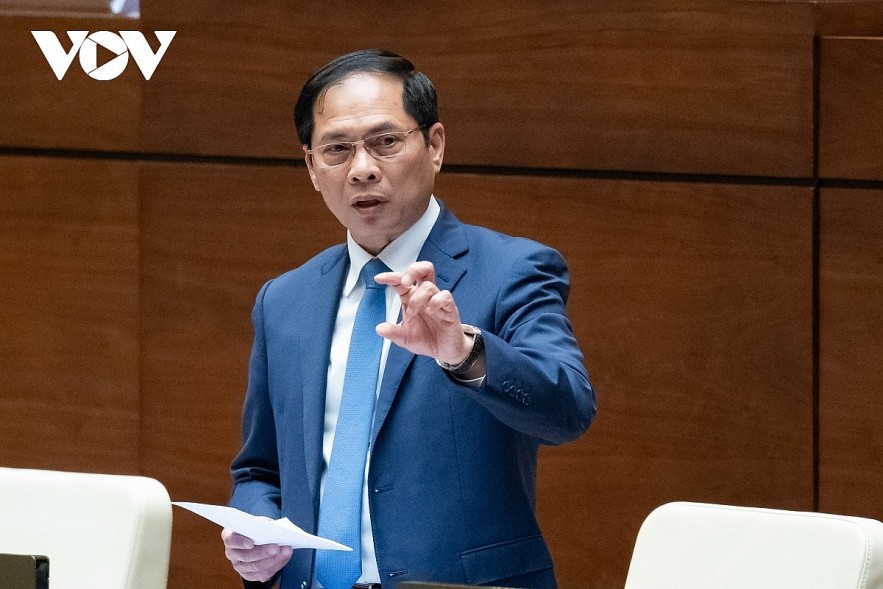 |
| Minister of Foreign Affairs Bui Thanh Son at the Q&A session. |
Minister Son presented a report on the ministry’s response to these issues, emphasizing that the ministry swiftly assists consular visits and contacts initiated by foreign countries based on information from relevant agencies. This ensures that foreign embassies and consulates can effectively fulfill their duties in protecting their citizens in Vietnam.
In 2023, the Ministry of Foreign Affairs announced 285 cases involving foreigners, with charges primarily including drug trafficking, fraudulent appropriation of property, intentional injury, and murder. Notably, 70 foreign nationals were given prison terms in Vietnam, while 108 others completed their sentences.
The Ministry facilitated 414 consular visits and contacts and granted consent for an additional 337 interactions.
The report also detailed administrative violations committed by foreigners, including illegal entry, overstaying temporary residence permits, online fraud, illegal drug use, theft, and robbery.
Since the beginning of this year, the ministry has reported 37 new cases involving foreign nationals undergoing prosecution, detention, or trial. Furthermore, 20 foreign nationals have commenced prison sentences in Vietnam, while 13 others finalized their terms.
This year, the ministry continues to facilitate consular visits and contacts, with 65 arrangements made and consent granted for 77 cases.
Regarding matters involving foreign nationals, foreign parties are notified by the Ministry of Foreign Affairs when their citizens are detained or serving prison sentences due to violations of Vietnamese law. This enables foreign parties to carry out citizen protection measures as requested. The Ministry continues to coordinate with competent agencies to allow consular visits to foreign nationals undergoing legal procedures.
Vietnam and RoK enhance agricultural collaboration
Vietnam, one of the world’s leading agricultural exporters, aims to strengthen cooperation with the Republic of Korea (RoK) in the field of agriculture, leveraging the RoK’s prowess in advanced technology applications in cultivation and processing, said Minister of Agriculture and Rural Development Le Minh Hoan on March 18.
During a workshop jointly held by the Ministry of Agriculture and Rural Development and the Korea International Cooperation Agency (KOICA) in Hanoi, Minister Hoan highlighted the potential for cooperation in agriculture between the two countries. Vietnam has a solid reputation for rice, vegetables, fruits, and aquatic products, while the RoK boasts modern agriculture technologies and various seedlings.
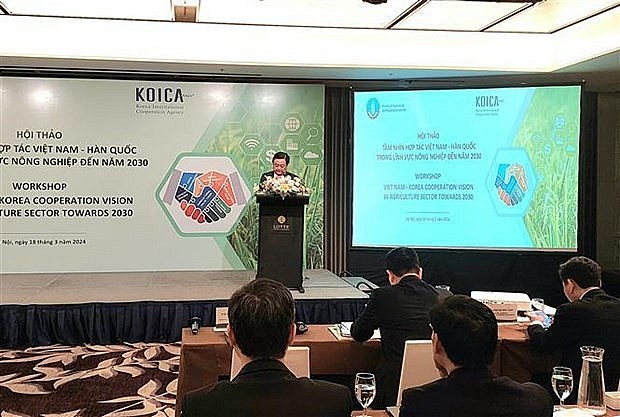 |
| Minister of Agriculture and Rural Development Le Minh Hoan (Photo: VNA) |
The two countries have collaborated in technology transfer for biofuel crops, high-quality vegetables, medicinal mushrooms, as well as safe food production and trade promotion of their respective strengths, among other areas, added Minister Hoan.
Minister Hoan expressed gratitude to KOICA for its support in building the Vietnam-Korea cooperation vision in agriculture and rural development for the 2024-2030 period. He emphasized the report’s crucial role in identifying cooperation potentials, promoting the comparative advantages of both countries, and diversifying cooperation and investment forms to enhance efficiency and ensure sustainability.
KOICA President Chang Won Sam stated that the organization considers agriculture a key collaboration area between Vietnam and the RoK. KOICA will support collaboration through various projects, including value chain improvement, market connectivity promotion, and capacity enhancement for climate change response, with digitalization, climate change, innovation, and technological applications being the key aspects, according to President Chang.
Deputy Director of the Institute of Policy and Strategy for Agriculture and Rural Development Nguyen Anh Phong mentioned that the RoK is currently the fourth-largest importer of Vietnamese agro-forestry-fishery products.
Since the Vietnam-Korea Free Trade Agreement took effect in 2015, Vietnam’s agricultural exports to the RoK have consistently increased, with an average revenue of over US$2 billion per year during 2016-2023. Conversely, Vietnam is the RoK’s fourth-largest market for agro-forestry-fishery goods. The RoK’s exports to Vietnam in these sectors have grown at an average rate of 6.2% per year.
Despite being the largest foreign investor in Vietnam, the RoK’s agricultural investments account for only 0.17% of its total FDI in the country. Investments are concentrated in localities with preferential policies and favorable conditions in terms of weather, land, infrastructure, labor force, and raw materials.
Phong added that the RoK is the second-largest provider of ODA for Vietnam’s agriculture. However, the capital accounts for only 3.36% of Vietnam’s total ODA.
Vietnam remains one of the world’s emerging economies: Asian Insiders
Vietnam’s dynamic economic shift is characterized by robust growth and the development of key trends leading to a promising future, according to a recent article by Asia-wide consulting network Asian Insiders.
The IMF ranks Vietnam among the top twenty fastest-growing global economies.
With a population of approximately 102 million and a nominal GDP of US$469 billion in 2024 (35th largest in the world or 26th based on PPP), Vietnam’s economy is directed through a series of five-year plans. These plans, shaped by the central government, outline strategies for economic development, growth targets, and reforms.
The Vietnamese government recognizes the importance of technological innovation for economic progress and has made substantial investments in research and development. Vietnam’s progress in innovation and technical competence is evident in its ascent on the Global Innovation Index (GII), ranking 46th among 132 countries in 2023, according to the GII report released by the World Intellectual Property Organization (WIPO). Vietnam maintains its second position among lower-middle-income countries on the GII.
Improving innovation and technical capabilities is crucial for attracting significant investments from industries, especially as major manufacturers seek to diversify production and take advantage of Vietnam’s lower labor costs.
Companies such as Samsung, LG, Foxconn, Panasonic, Bosch, GE, Piaggio, and Yamaha have established research and development facilities or manufacturing bases in Vietnam. This underscores Vietnam’s potential as an innovation and production hub.
Vietnam’s geographical location along its long 3,300km eastern coastline, offering 45 seaports of various grades, further supports its economic improvement. Recent and upcoming infrastructure improvements significantly enhance Vietnam’s economy, as reported by VGP.
Vietnam’s economic progress is driven by a considerable influx of foreign direct investments (FDIs). The country successfully attracts significant investments, positioning it among the top countries globally. In 2023, Vietnam attracted US$36.6 billion in FDIs, a 32% increase from the previous year. The figure includes newly registered capital of approximately US$20 billion, a remarkable 62% increase from the previous year. This comprises 3,188 newly registered projects in 2023.
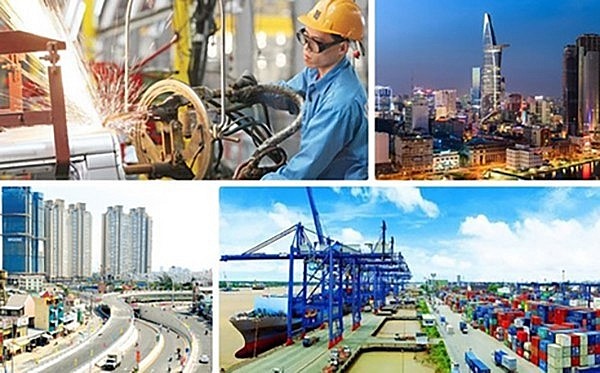 |
| Photo: VGP |
With strong GDP growth, increasing FDI, significant infrastructure improvements, and a rebounding labor market and middle class, Vietnam’s economy has a positive outlook. The combination of export-driven growth and a thriving domestic market positions Vietnam for sustained and dynamic growth, as highlighted by Asian Insiders.



